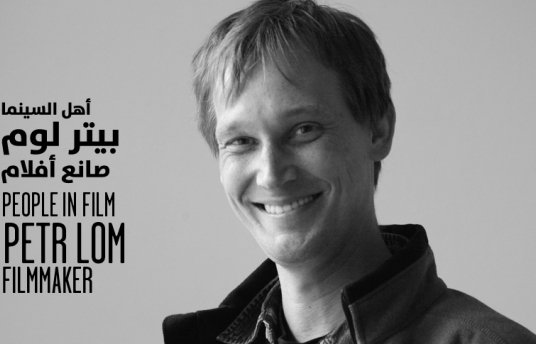People in Film: Petr Lom
Feb 20, 2012

Petr Lom was born in Prague in 1968, and grew up in Canada. A former academic with a Ph.D in political philosophy from Harvard, he gave up his university career in 2003 to become full-time documentary filmmaker. His first film was “Bride Kidnapping in Kyrgyzstan” in 2004. “Back to the Square” his latest documentary is set in Egypt and examines the lives of five characters after the revolution.
DFI: Why did you decide to shift to documentary making?
Lom: I liked being a professor, I loved what I was doing but it wasn’t really fulfilling. Mainly I love filmmaking because I love adventure, something creative, artistic, and practical while being engaged with people. And I feel that the issues I’ve chosen so far are very important.
DFI: Why have you decided to do this documentary in Egypt?
Lom: Serendipity. I was interested in the region; my last film was in Iran in 2009 on president Ahmadinejad. I realised that I was interested in stories of ordinary people from Egypt, and as the revolution progressed over several months, it became clearer and clearer that the most important issues had to do with basic human rights.
DFI: The five people in “Back to the Square” are very outspoken, angry citizens who are not afraid to say what’s on their mind. How did find them?
Lom: I had, at one point, 14 characters. I investigated some of them – like Micheal’s story, the blogger who was imprisoned, Waly and Salwa. As for Lamis and Mohammed the ex-convict, it was pure chance. I met Lamis when I was filming at the police station. Mohammed was referred to me by my assistant, who found him through her father, at the hospital.
DFI: What will happen to the people of the documentary once it’s shown in Egypt.
Lom: Of course I worry about them. I told them exactly what I am doing, it was made very clear. And these are very courageous people who wanted to tell their story. I think this is very brave and has to be respected. But we certainly worry that something bad would happen to them.
DFI: Weren’t you worried as a foreigner that you might be criticised for not knowing Egypt well, or being objective?
Lom: So far I have made four of my films in countries where I’m not from, not an expert of, and don’t speak the language. It’s a risk of course, but my highest principle when I am working is that dramatic things don’t allow you to make your own conclusion. It’s so important to show respect to the people you’re filming. I got the nicest compliment on my film when I was screening it to different people in Egypt, by an editor who said, “When I finished watching the film I thought, ‘Oh it’s made by an Egyptian’”. I hope that’s true because it’s so sensitive in the region to have a feeling of any kind of either oriental imperialism or cultural imperialism. I hope I haven’t failed. It’s up to you to judge.
DFI: How would you describe the situation in Egypt now?
Lom: Now I think there’s much more awareness of what the real situation in Egypt is. In the beginning of the revolution until the summer, there was very little attention given to the real stories in the international media, which still categorised the uprising as the “Facebook Revolution”. I wanted to tell the true stories of the people.
DFI: Tell us about your documentary, “Letters to the President”.
Lom: The conditions in Iran were more restricted because it’s an authoritarian regime. I filmed in Iran for five months. I went there mainly out of curiosity as there was a great risk that Iran would be bombed in 2008. I was trying to give the regime a voice, to treat it with respect. But the longer I was there, the more I learnt about it. That’s why the film has this ironic turn to it. There’s kind of a joke subject to it: people writing letters to the president and supposedly there are more than a million asking for a favour. So it’s a way into the story to tell you the feeling of what it is like living in Iran today.
DFI: Do you feel that people in Egypt and the Mena region are more enthusiastic about making documentaries and telling their stories?
Lom: I think there’s a huge transformation. My partner is making a film about young artists in Egypt, coaching them to film stories about themselves. A lot of young artists now are super excited about the freedom they have and that they’re able to film now for the first time. On the other hand, some were telling me that they’re so emotionally overpowered from the revolution and forget their cameras at home.